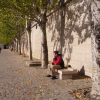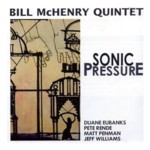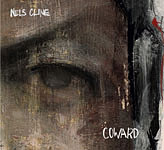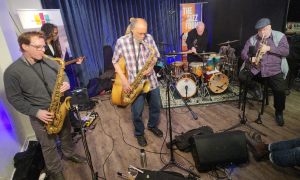Home » Jazz Articles » Live Review » Keith Jarrett's Return To Carnegie Hall
Keith Jarrett's Return To Carnegie Hall
This concert seemed to surpass many of Jarrett's previous shows in terms of the audience-performer connection, as Jarrett was pushed by a raucous and energetic crowd to new heights of melodic, harmonic, and virtuosic improvisation.
Solo Piano Improvisations
Carnegie Hall
New York, New York
January 29th 2009
Every time Keith Jarrett walks onto the stage of a concert hall to perform improvisational concerts, he and the audience are taking a mutual risk—one that is in stark contrast to most others. Jarrett has no safety net, no backup group, no rhythm section, and no repertoire. Only his passion and perseverance, in the face of absolute scrutiny, can carry him through the concert successfully. While some of Jarrett's concerts produce some of the finest music heard by human ears, many fail to live up to Jarrett's extremely high standards—standards which frustrate some of his audience, who wonder why a concert which they attended is never released.
However, when the stars align and everything is just right, a concert can become legendary, as was the case on September 26, 2005 at New York's Carnegie Hall. This was a concert that Jarrett described as "mind boggling" and, when referring to the audience in an interview, added: "There are only two concerts where I walked onstage and immediately felt that all the planets were in alignment." (The other concert he is referring to is of course the famous Koln Concert of 1975). He further stated: "In a funny way, it's solitaire: I play with the audience, and we almost become the same mental and psychological spirit. Of course, that's the attempt. But I never heard it succeed like that before...I probably will never experience the unanimity of spirit in that hall again."
His return to Carnegie Hall on January 29, 2009, however, proved Jarrett's assumption wrong. This concert seemed to surpass many of Jarrett's previous shows in terms of the audience-performer connection, as Jarrett was pushed by a raucous and energetic crowd to new heights of melodic, harmonic, and virtuosic improvisation.
Jarrett's improvised music was unique in its achievement, touching base with nearly every aspect that has shaped his career. The concert began with a typical, post-Chronic Fatigue Syndrome "big bang" exploration into musical harmony and rhythm. While often falsely characterized as "atonal," the pianist's harmonies are actually very complex in structure and his tonality and rhythm sophisticated in execution. This opening piece, in particular, was practically without precedent. There were seven pieces in the first set, including segments that ranged from aggressively funky and dissonant to slower and more melodic movements, expressive of a poignant lyricism. The highlight of the set was a piece that featured rolling tremolo chords, including a haunting improvised melody. Reminiscent of the interior section of the second part of the La Scala concert from 1995, the piece was followed, in stark contrast, by an achingly slow blues, which kept the audience at the edge of its seats.
The second set was similar in style to the 2005 Carnegie Hall Concert's second set, but very different in terms of substance. Both sets began with violently avant-garde piano explorations. However, this concert's piece was much more developed in terms of motivic development—overall more moving, capable of drawing the type of intense applause usually reserved for more popular styles of music. Again, as in the second set of the 2005 concert, the second piece was a gospel blues, for which Jarrett is legendary. It was different, however, not only in chord structure but in overall style; like a locomotive, it started slowly but picked up momentum as it went along and, near the end, was nearly unstoppable. When it finally ended, it drew an ear-piercing applause, and after the last ovations rang out, Jarrett asked if he could play the ending again. Then, to gracious approval, he did just that and nearly brought the roof down for the second time. After one of the most stunning ballads Jarrett may well have ever performed, came the last improvisation. This piece hovered around an ostinato theme that eventually turned into a melodic Middle Eastern exploration, with Jarrett using a ringing motif and many sympathetic harmonies—chords not struck but rather overtones based on the melody and allowed to ring out.
After a resounding standing ovation, Jarrett proceeded to play his encores, which included an unusually introspective rendition of Harold Arlen's "Somewhere Over the Rainbow," the melody of Cole Porter's tragicomic "Miss Otis Regrets," and an impressive display of ragtime virtuosity with James P. Johnson's "Caroline Shout." After these three tunes, many fans begun yelling out requests, which Jarrett responded by saying: "I'll play all those songs some other time...how about a ballad?" to which the crowd responded with incredible enthusiasm. The performer also remarked: "You'll never hear me say that again," drawing laughter as well as applause. The ballad was Harold Adamson and Jimmy McHugh's "Where Are You?" followed by a dark and lyrical rendition of Matt Dennis and Earl Brent's "Angel Eyes."
The spectacular, even magical, moment of the evening came just as the audience expected Jarrett to walk off for the last time. Instead the unpredictable artist stopped to take the mic and explain that he didn't record in studios because his music would be impossible without the connection that he feels with his audience—a connection, he further stated, that is uniquely possible in music, and only in music. No other art form, he asserted, permits a closer connection between audience and performer, and this bond is what allows him and his audience to create such awe-inspiring and remarkable music. He then immediately turned, walked over to the piano, and sat down. Then, for the first time in his career, Jarrett played a sixth encore—a medium blues that summed up the entire energy of the concert. It was as if Jarrett was so moved by this audience that he ignored the time and decided, why not play one more? It's doubtful an audience was more deserving—and appreciative.
Jarrett's Carnegie Hall concert may well have been the greatest solo performance of his career. To see him raise the bar again was truly a spectacular event—not only for himself but for the nearly three thousand fans, which gave him six passionate standing ovations and would have easily given him six more. For many, this concert was a dream come true, providing some compensation for Jarrett fans who wish they could have been at previous triumphs such as The Koln Concert in 1975, The Vienna Concert in 1991, and The Carnegie Hall Concert in 2005. Another milestone has been added to the list: Carnegie Hall 2009 will undeniably be remembered as a singular triumph in Keith Jarrett's career and, as far as Jarrett fans are concerned, quite possibly in music.
Tags
PREVIOUS / NEXT
Support All About Jazz
 All About Jazz has been a pillar of jazz since 1995, championing it as an art form and, more importantly, supporting the musicians who make it. Our enduring commitment has made "AAJ" one of the most culturally important websites of its kind, read by hundreds of thousands of fans, musicians and industry figures every month.
All About Jazz has been a pillar of jazz since 1995, championing it as an art form and, more importantly, supporting the musicians who make it. Our enduring commitment has made "AAJ" one of the most culturally important websites of its kind, read by hundreds of thousands of fans, musicians and industry figures every month.

























